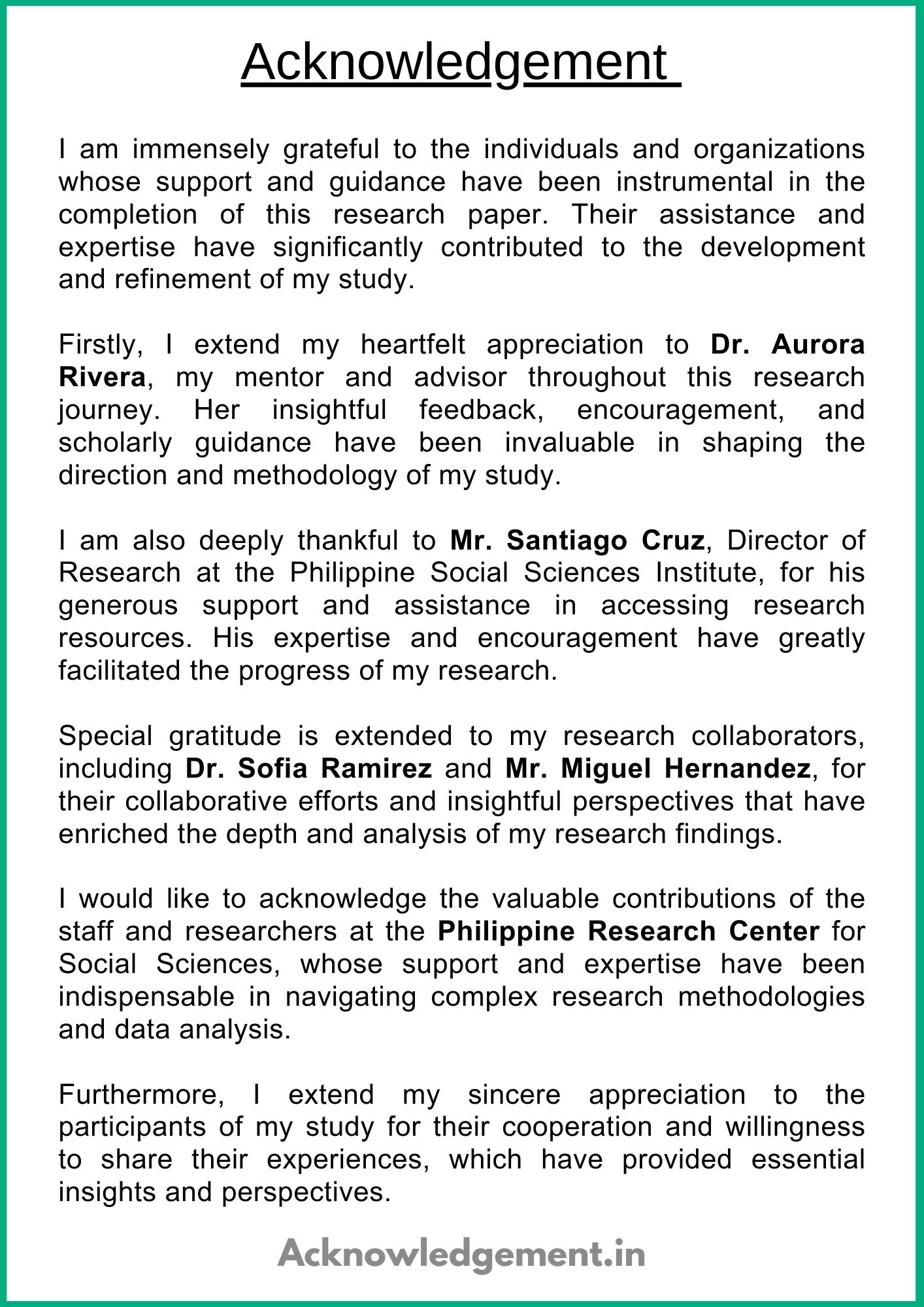

Acknowledgement in Research Paper – A Quick Guide [5 Examples]
The acknowledgement section in your research paper is where you thank those who have helped or supported you throughout your research and writing. It is a short section of 3-5 paragraphs or no more than 300 words you put on a page after the title page.
In this post, we are going to provide you with five examples of acknowlegdement section and a handful of best practices you can make your work look professional.

Saying thank you with style
How to write an acknowledgement: the complete guide for students, why should i include an acknowledgement in my research paper.
Acknowledging assistance and contributions from others can establish your integrity as a researcher. This will eventually make your work more credible.
What should be acknowledged about (aka thankful for)?
In your acknowledgement, you can show gratitude for those who provide you with resources in the following area:
- Technical help may include people who helped you by providing materials and supplies.
- Intellectual help includes academic advice and assistance.
- Mental help can be any kind of verbal support and encouragement.
- Financial support that is obviously related to monetary support
Who should be included in the acknowledgement of a research paper?
You can include everyone who helped you technically, intellectually, or financially (assistance with grants or monetary help) in the process of researching and writing your research paper. Except for your family and friends, you should always include the full names with the title of these individuals:
- Your profession, supervisor, or teacher
- Academic staff (e.g. lab assistant) of your school/college
- Your department, faculty, college, or school
- Classmates, teammates, co-workers, or colleague
- Friends and family members
You can start with your professor or the individuals who supported you the most throughout the research. And then you can continue by thanking your institution and then the reviewer who reviewed your paper. Then you can thank your friends and families and any other individual who helped.
What is the tone of the acknowledgement in a research paper?
You should write your acknowledgement in formal language with complete sentences. It is appropriate to write in the first person (‘I’ for a single author or ‘we’ for two or more).
Note that personal pronouns such as ‘I, my, me …’ are nearly always used in the acknowledgements only. For the rest of the research paper, such personal pronouns are generally avoided.
Writing an acknowledgement for research paper is one of the important parts of your project report. You need to thank everyone for helping you with your paper . Here are some examples of acknowledgement for your research paper.
Acknowledgement in Research Paper: Example 1
Acknowledgement in research paper: example 2, acknowledgement in research paper: example 3, acknowledgement in research paper: example 4, acknowledgement in research paper: example 5.
You can use these or try to create your own version for your project report. Also, you can use our auto acknowledgement generator tool to automatically generate acknowledgement for your project.
Where should I put the acknowledgement section?
The acknowledgements section should appear between your title page and your introduction in your research paper.
How long is an acknowledgement in a research paper?
The acknowledgement section (usualy inserted as a page) of your research paper should consist of 3-5 paragraphs or no more than 300 words you put on a page after the title page.
Should I use the full names of family members in an acknowledgement?
You do not necessarily need to use the full name for your family and friends (it would sound pretty awkward to use the full name of your parent or spouse right?), you should always include the full names with the title for all other individuals in your acknowledgement.
Can I use “first person” in an acknowledgement?
Yes. It is appropriate to write in the first person (‘I’ for a single author or ‘we’ for two or more).
What is an acknowledgement in academic writing?
An acknowledgement is a page is where you show appreciation to people who helped or supported you intellectually, mentally, or financially in your academic writing.
It should be no longer than one page.

More Definitions on Acknowledgement
- Acknowledgement vs Empathy What is the Difference Between Acknowledgement and Empathy?
- Acknowledgement vs Acceptance Does Acknowledgement Mean Acceptance? Lessons From History and the Bible
- Acknowledgement vs Agreement Is Acknowledgement the Same as Agreement?
- Acknowledgement Receipts vs Official Receipts What’s the Difference Between Acknowledgement Receipts and Official Receipts?
“Acknowledgement” vs “Acknowledgment”… …what the hack?

Both “acknowledgement” and “acknowledgment” are used in the English-speaking world. However, acknowledgement with the “e” in the middle is more commonly used. It is up to 24.5 times more popular in the top 5 English-speaking countries in the world.
Other Popular Acknowledgement Examples
For work or business Acknowledgement Receipt of Payment [4 Examples] Acknowledging Receipt of Documents: A Quick Guide with Examples Acknowledgement for Presentation [9 Examples] Acknowledgement for Job Offer [3 Examples] Acknowledgement for Business Plan [4 Examples] Acknowledgement for Work Immersion [5 Examples] Acknowledgement of Receipt of Appraisal [3 Examples] Acknowledegment of Debt [5 Examples] Resignation Acknowledgement for Employers [5 Examples]
Academic Acknowledgement for Research Paper [5 Examples] Acknowledgement for Internship Report [5 Examples] Acknowledgement for Thesis and Dissertation [15 Examples] Acknowledgement for Portfolio [5 Examples] Acknowledgement for Case Study [4 Examples] Acknowledgement for Academic Research Paper [5 Examples] Acknowledgement for College/School Assignment [5 Examples] Acknowledgemet to God in Reports [5 Examples]
Others Acknowledgement to Funeral Attendees [5 Examples] Funeral Acknowledgement Templates (for Newspapers and Websites) Common Website Disclaimers to Protect Your Online Business Notary Acknowledgement [5 Examples]
Acknowledgement Examples for School/College Projects
Most popular Acknowledgement For School/College Projects [7 Examples] Acknowledgement for English Project [5 Examples] Acknowledgement for Project Class 11 and 12 Acknowledgement for Project of Class 8, 9 and 10 By subjects Acknowledgement for Accounting Project [3 Examples] Acknowledgement for Business Studies Project [5 Examples] Acknowledgement for Chemistry Project [5 Examples] Acknowledgement for Computer Project [5 Examples] Acknowledgement for Economics Project [5 Examples] Acknowledgement for English Project [5 Examples] Acknowledgement for Geography Project [5 Examples] Acknowledgement for History Project [5 Examples] Acknowledgement for Maths Project for Students [5 Examples] Acknowledgement for Physics Project [5 Examples] Acknowledgement for Social Science Project [5 Examples] Others Acknowledgement for Group Project [5 Examples] Acknowledgement for Graduation Project [5 Examples] Acknowledgement for Disaster Management Project [3 Examples] Acknowledgement for Yoga Project [3 Samples]
How-to Guides on Academic Writing and Others
Most popular How to Write an Acknowledgement: The Complete Guide for Students How to Write an Acknowledgement for College Project? How to Write a Dedication Page for a Thesis or Dissertation? More on acknowledgements How to Write Acknowledgment for a Dissertation or a Thesis? Is Acknowledgement and Dedication the Same? Thesis or Dissertation How to Write a Master’s Thesis: The Ultimate Guide How to Write a Thesis Proposal? How to Write an Abstract for a Thesis? How to Write a Preface for a Thesis? Others How to Write an Introduction for a Research Paper? 7 Real Research Paper Examples to Get You Started How to Write Cover Letter for an Internship Program? How to Write an Internship Acceptance Letter? How to Write a Leave Application? For Schools and the Workplace How to Write a Resignation Letter?
Introduction to Academic Writing
By O.P. Jindal Global University Duration: 16-hour Cost: FREE Gain an in-depth understanding of reading and writing as essential skills to conduct robust and critical research for your writing.
Writing in English at University
By Lund University Duration: 24-hour Cost: FREE Learn how to structure your text and arguments, quote sources, and incorporate editing and proofreading in your academic writing.
Academic English: Writing Specialization
By the University of California, Irvine Duration: 6 months Cost: Free 7-day trial, USD39 per month The skills taught in this Specialization will empower you to succeed in any college-level course or professional field. You’ll learn to conduct rigorous academic research and to express your ideas clearly in an academic format. Share your Course Certificates in your LinkedIn profile, on printed resumes, CVs, or other documents.

Thank you, your samples really helped me.
This is great! Your samples really helped me in my research. Thank you and more power!
I’m so grateful that you make this kind of blog, I really need this for my research. Thank you so much… God bless you.
Thank you so much for the samples you have provided, it has helped me a lot.
Leave a Comment Cancel Reply
Your email address will not be published. Required fields are marked *
Save my name, email, and website in this browser for the next time I comment.

Acknowledgement in Research Paper | How to Write | Perfect Example
What is acknowledgement in research paper.
Acknowledgement in a research paper is the section where the author expresses gratitude to individuals and organizations who have contributed to the completion of the study. This section is usually placed at the beginning or end of the paper and is an important part of the research process. It allows the author to recognize the support, assistance, and guidance they have received from others in the course of their research.
What is the purpose of acknowledgement in research paper?
The acknowledgement section is an opportunity for the author to show appreciation for anyone who has helped them in the research process, including mentors, advisors, colleagues, and funding agencies. It is also a way to acknowledge the contributions of participants, interviewees, or anyone else who has played a role in the study.
Acknowledgements can also include thanks to individuals who have provided critical feedback, technical assistance, or resources that have been essential to the research project. Overall, this section is a way for the author to show their appreciation for the collaborative and supportive nature of the research community.
How to write acknowledgement in research paper?
- Identify Key Contributors : Make a list of individuals and organizations that have contributed significantly to your research. This includes advisors, mentors, collaborators, funders, participants, and institutions.
- Understand the Purpose : Acknowledgments are meant to recognize and thank those who have supported or contributed to your research in various ways. Understand the purpose of this section is to express gratitude and recognize their contributions.
- Be Genuine and Specific : Your acknowledgments should be sincere and specific. Avoid generic expressions of thanks and instead, mention the specific contributions each person or organization made to your research.
- Start with Formality : Begin your acknowledgment section with a formal tone and expression of gratitude. Address individuals with their appropriate titles, such as Dr., Prof., Mr., or Ms., and mention any institutional affiliations if relevant.
- Personalize Your Thanks : Tailor your acknowledgments to acknowledge each individual’s specific contributions. Mention how their support, guidance, or expertise influenced your research or contributed to its success.
- Maintain Professionalism : While acknowledgments can be personal, maintain a professional tone and avoid overly informal language or colloquialisms. Remember that this section is part of your scholarly work.
- Consider Cultural Sensitivities : Be mindful of cultural norms and sensitivities when expressing gratitude, especially if your research involves international collaborations. Tailor your acknowledgments to reflect cultural expectations or customs, as appropriate.
- Proofread Carefully : Ensure your acknowledgments are free of grammatical errors and typos. Take the time to review and edit this section to ensure clarity and coherence.
- Respect Space Limitations : While it’s important to acknowledge all key contributors, be mindful of space limitations in your research paper. Prioritize mentioning those who made significant contributions while being respectful of length constraints.
- End on a Positive Note : Conclude your acknowledgment section with a positive and appreciative tone. Express your gratitude to everyone who supported your research journey, including family, friends, colleagues, and institutions.
Example of Acknowledgement in Research
I am immensely grateful to the individuals and organizations whose support and guidance have been instrumental in the completion of this research paper. Their assistance and expertise have significantly contributed to the development and refinement of my study.
Firstly, I extend my heartfelt appreciation to Dr. Aurora Rivera, my mentor and advisor throughout this research journey. Her insightful feedback, encouragement, and scholarly guidance have been invaluable in shaping the direction and methodology of my study.
I am also deeply thankful to Mr. Santiago Cruz, Director of Research at the Philippine Social Sciences Institute, for his generous support and assistance in accessing research resources. His expertise and encouragement have greatly facilitated the progress of my research.
Special gratitude is extended to my research collaborators, including Dr. Sofia Ramirez and Mr. Miguel Hernandez, for their collaborative efforts and insightful perspectives that have enriched the depth and analysis of my research findings.
I would like to acknowledge the valuable contributions of the staff and researchers at the Philippine Research Center for Social Sciences, whose support and expertise have been indispensable in navigating complex research methodologies and data analysis.
Furthermore, I extend my sincere appreciation to the participants of my study for their cooperation and willingness to share their experiences, which have provided essential insights and perspectives.
I wish to express my profound gratitude to my family and friends for their unwavering support, encouragement, and understanding throughout this research endeavor. Their belief in my abilities has been a constant source of motivation and inspiration.

Acknowledgement in Research Paper Example
We extend our heartfelt gratitude to the individuals and institutions whose unwavering support has been indispensable in the completion of this research paper. Their guidance, encouragement, and expertise have greatly contributed to the success of our study.
Firstly, we express our sincere appreciation to Dr. Juanita Cruz, Professor of Economics at the University of the Philippines, for her invaluable mentorship and insightful feedback throughout the research process. Her expertise in the field has been instrumental in shaping the direction of our study.
We are also indebted to Dr. Manuel Reyes, Director of the Philippine Economic Development Institute, for his generous assistance and provision of research resources. His support has been pivotal in enhancing the quality and depth of our analysis.
Special thanks are extended to our research collaborators, including Dr. Sofia Garcia from the Department of Political Science at Ateneo de Manila University, and Dr. Miguel Hernandez from the Department of Sociology at Mapua University. Their collaboration and expertise have enriched our research with diverse perspectives and profound insights.
We would like to acknowledge the invaluable assistance provided by the staff and researchers at the Philippine Institute for Development Studies, who generously shared their knowledge and resources throughout the duration of our study.
Furthermore, we extend our gratitude to the participants of our study, whose cooperation and willingness to share their experiences have been instrumental in shaping our findings.
- Acknowledgement for Thesis
- Acknowledgement for Dissertation
Similar Posts
Acknowledgement for dissertation [with example].
Writing a dissertation is a significant academic undertaking that requires extensive research, critical analysis, and original contributions to…
Acknowledgement for Thesis [Sample and Best Practice]
What is Acknowledgement in Thesis? Writing a thesis is a significant milestone in a student’s academic journey. A…
Acknowledgement for Disaster Management Project PDF
Writing acknowledgement for disaster management projects in schools and colleges is an important aspect that should not be…
Acknowledgement for Portfolio | How to Write | With Sample
Acknowledgement for portfolio is crucial for recognizing the contributions and efforts of others. It serves as a way…
Acknowledgement for Internship Report 📝
Writing an acknowledgment for your internship report may seem like a small and insignificant task, but it actually…
Acknowledgement for Commerce Project PDF
Commerce project for Class 12 students is a significant academic endeavor that requires extensive analysis, and compilation of…
Academia Bees
Acknowledgement for Paper Publication (10 Samples)
July 11, 2023
No Comments
By Mohsin Khurshid
Acknowledgement for paper publication is a crucial aspect that recognizes the contributions and support received throughout the research process. It holds significant value in academic papers, showcasing appreciation for the individuals and institutions that have played a role in the study’s success. In this article, we will delve into the importance of acknowledgement in paper publication and provide 10 comprehensive samples to guide you in crafting impactful acknowledgements for your own research. Whether you wish to acknowledge research collaborators, funding sources, mentors, or other individuals who have contributed to your work, these samples will assist you in expressing your gratitude effectively. Join us as we explore the art of acknowledgement and discover how to create acknowledgements that resonate with the collaborative nature of scholarly endeavors.
Table of Contents
- 1 Understanding the Importance of Acknowledgement
- 2.1 Sample 1 – Acknowledgement for Research Collaboration
- 2.2 Sample 2 – Acknowledgement for Funding Support
- 2.3 Sample 3 – Acknowledgement for Mentorship and Guidance
- 2.4 Sample 4 – Acknowledgement for Institutional Support
- 2.5 Sample 5 – Acknowledgement for Peer Reviewers
- 2.6 Sample 6 – Acknowledgement for Data and Materials
- 2.7 Sample 7 – Acknowledgement for Technical Assistance
- 2.8 Sample 8 – Acknowledgement for Editorial or Proofreading Assistance
- 2.9 Sample 9 – Acknowledgement for Inspiration and Support
- 2.10 Sample 10 – Acknowledgement for Personal Support
- 4 Conclusion
Understanding the Importance of Acknowledgement
Acknowledgement plays a crucial role in academic papers, serving multiple purposes within the scholarly community. Firstly, it provides an opportunity for authors to express gratitude and appreciation towards individuals, organizations, or institutions that have contributed to the research project in various ways. These contributions can include financial support, data collection assistance, intellectual guidance, or access to resources.
Beyond mere gratitude, acknowledgement serves as a means of giving credit where it is due. It recognizes the valuable input and collaboration of others, ensuring that their contributions are acknowledged and acknowledged by the academic community. By acknowledging the efforts of others, researchers uphold the principles of academic integrity and promote transparency in the research process.
Ethical considerations are also an integral part of writing an acknowledgement section. Authors must carefully navigate issues such as conflicts of interest, ensuring that they disclose any potential conflicts and maintain objectivity in their acknowledgements. Additionally, it is essential to respect the privacy and confidentiality of individuals mentioned in the acknowledgement, seeking their permission before including their names or affiliations.
Conventions related to acknowledgement may vary across disciplines and academic journals. Authors should familiarize themselves with the specific guidelines and requirements of their target journal to ensure compliance. Some journals may provide templates or specific instructions on how to structure the acknowledgement section, while others may have specific word limits or content restrictions.
In summary, understanding the importance of acknowledgement in academic papers is crucial for researchers. It serves as a means of expressing gratitude, giving credit to contributors, upholding academic integrity, and adhering to ethical considerations. By following conventions and guidelines specific to their field, authors can effectively convey their appreciation and recognition in the acknowledgement section of their paper.
10 Samples of Acknowledgement for Paper Publication
Explore these detailed samples of acknowledgements to effectively acknowledge contributors in your research papers.
Sample 1 – Acknowledgement for Research Collaboration
Acknowledging the collaborative efforts and contributions of research team members is a crucial aspect of the acknowledgement section in academic papers. The following is a detailed sample acknowledgement that demonstrates how to acknowledge research collaborators and team members:
I would like to express my sincere gratitude to the members of the research team who contributed to the successful completion of this study. Their dedication, expertise, and commitment were instrumental in the realization of our research objectives. I am thankful for their valuable insights, collaborative spirit, and unwavering support throughout the project.
I would like to extend my heartfelt appreciation to [Name], [Name], and [Name] for their invaluable contributions to the data collection process. Their meticulous efforts ensured the accuracy and reliability of our research findings. Additionally, I am grateful to [Name] for their assistance in data analysis and interpretation, which greatly enhanced the depth and quality of our research outcomes.
Furthermore, I would like to acknowledge the guidance and mentorship provided by [Name]. Their expertise in [area of expertise] was invaluable in shaping the direction of this research and refining our methodology. Their constructive feedback and insightful suggestions played a pivotal role in elevating the overall quality of this study.
I am also indebted to the support staff and administrators who facilitated the smooth operation of our research activities. Their assistance in securing necessary permissions, organizing logistics, and managing administrative tasks was vital to the success of this project.
Lastly, I would like to express my deep appreciation to the funding agency or organization that provided financial support for this research. Their investment in our work enabled us to conduct this study and make meaningful contributions to the field.
In conclusion, I am immensely grateful to all the individuals who contributed to this research collaboration. Their dedication, expertise, and unwavering support have been instrumental in the accomplishment of our research goals. Without their invaluable contributions, this study would not have been possible.
Sample 2 – Acknowledgement for Funding Support
Acknowledging the financial support received for research is an important aspect of the acknowledgement section in academic papers. The following is a detailed sample acknowledgement that demonstrates how to acknowledge funding support:
I would like to express my sincere appreciation to [Funding Agency/Organization] for their generous financial support of this research project. Their funding played a crucial role in the successful execution of this study and the attainment of our research goals.
The support provided by [Funding Agency/Organization] enabled us to conduct data collection, analysis, and interpretation, as well as cover expenses related to research materials, participant recruitment, and travel, where applicable. Their investment in our work has significantly contributed to the quality and impact of our research findings.
I would also like to extend my gratitude to the grant administrators and program officers at [Funding Agency/Organization] for their guidance and assistance throughout the grant application and management process. Their expertise and support were invaluable in ensuring a smooth and efficient funding experience.
Furthermore, I am grateful to my research team members and collaborators who have contributed their time, expertise, and efforts to this project. Their dedication and hard work have been instrumental in the successful completion of this research.
In conclusion, I am deeply thankful to [Funding Agency/Organization] for their financial support, without which this research would not have been possible. Their investment in our work has made a significant impact and has contributed to advancements in the field. I am truly grateful for their commitment to supporting research and fostering academic growth.
Sample 3 – Acknowledgement for Mentorship and Guidance
Acknowledging the contributions of mentors and advisors is essential in recognizing the guidance and support they have provided throughout the research process. The following is a detailed sample acknowledgement that demonstrates how to acknowledge mentorship and guidance:
I would like to express my heartfelt gratitude to my mentor, [Mentor’s Name], for their invaluable guidance, expertise, and support throughout the course of this research. Their extensive knowledge, insightful feedback, and unwavering encouragement have been instrumental in shaping the direction and quality of this study.
I am truly grateful for [Mentor’s Name]’s dedication and commitment to my academic growth. Their mentorship has not only expanded my understanding of the subject matter but has also enhanced my research skills and critical thinking abilities. Their willingness to invest their time and effort in providing guidance and constructive criticism has greatly contributed to the successful completion of this research project.
I would also like to extend my appreciation to [Advisor’s Name] for their valuable input and advice throughout the research process. Their expertise in [specific field or area] has been invaluable in shaping the methodology and interpretation of the findings. Their constructive feedback and thoughtful suggestions have significantly enhanced the quality and rigor of this study.
Furthermore, I would like to acknowledge the contributions of other members of my research committee, [Committee Member 1’s Name] and [Committee Member 2’s Name]. Their expertise and insights have provided valuable perspectives and have contributed to the overall excellence of this research.
In conclusion, I am sincerely grateful to my mentor, [Mentor’s Name], and my advisor, [Advisor’s Name], for their unwavering support and guidance. Their mentorship and expertise have been transformative in my academic journey, and I am privileged to have had the opportunity to learn from their wisdom and experience.
Sample 4 – Acknowledgement for Institutional Support
Acknowledging the support and resources provided by institutions is crucial in recognizing their contribution to the research project. The following is a detailed sample acknowledgement that demonstrates how to acknowledge institutional support:
I would like to express my sincere gratitude to [Institution’s Name] for their unwavering support and provision of resources throughout the course of this research. The research facilities and infrastructure provided by [Institution’s Name] have played a significant role in the successful completion of this study.
I am grateful for the access to state-of-the-art laboratories, research materials, and technological resources offered by [Institution’s Name]. These resources have been instrumental in conducting experiments, gathering data, and analyzing findings. The research environment provided by [Institution’s Name] has fostered an atmosphere of innovation and collaboration, allowing for the pursuit of academic excellence.
I would also like to extend my appreciation to the administrative staff and personnel at [Institution’s Name] for their assistance and support throughout the research process. Their responsiveness and willingness to provide guidance on administrative matters have been invaluable.
Furthermore, I would like to acknowledge the financial support provided by [Institution’s Name]. The research grants and scholarships awarded by [Institution’s Name] have enabled the realization of this project and have alleviated the financial constraints associated with conducting research.
In conclusion, I am deeply grateful to [Institution’s Name] for their unwavering support, provision of resources, and financial assistance. Their commitment to promoting research and academic excellence has been instrumental in the successful completion of this study.
Sample 5 – Acknowledgement for Peer Reviewers
Acknowledging the contributions of peer reviewers is essential in recognizing their valuable feedback and input towards improving the quality of the research. The following is a detailed sample acknowledgement that demonstrates how to acknowledge peer reviewers:
I would like to extend my heartfelt appreciation to the anonymous peer reviewers who generously dedicated their time and expertise to review and provide constructive feedback on this research paper. Their insightful comments and suggestions have significantly enhanced the quality and rigor of this study.
The meticulous review process conducted by the peer reviewers has played a crucial role in strengthening the methodology, refining the arguments, and improving the overall clarity and coherence of the research. Their expertise and critical evaluation have helped in identifying and addressing potential gaps, ensuring the accuracy and validity of the findings.
I am grateful for the valuable contributions made by the peer reviewers in shaping this paper into its final form. Their commitment to scholarly excellence and their dedication to advancing the field have been instrumental in improving the quality and impact of this research.
While their identities remain anonymous, I would like to express my sincere gratitude to each and every peer reviewer who played a part in the review process. Their time, expertise, and feedback are deeply appreciated.
Sample 6 – Acknowledgement for Data and Materials
Acknowledging the sources of data, materials, or tools used in the research is crucial to give proper credit and recognition. The following is a detailed sample acknowledgement that demonstrates how to acknowledge data and materials:
I would like to express my sincere gratitude to [Name/Organization] for providing access to the [Specify the data/materials/tools] used in this research. Their contribution has been invaluable in facilitating the data collection process and enabling the analysis conducted in this study.
The [Specify the data/materials/tools] have played a pivotal role in the success of this research, providing essential insights, information, and resources that have contributed to the depth and quality of the findings. Without their support and cooperation, this research would not have been possible.
I am deeply appreciative of the efforts made by [Name/Organization] in making the [Specify the data/materials/tools] available and ensuring their reliability and relevance to the research objectives. Their commitment to data sharing and collaborative research has greatly enriched the outcomes of this study.
I would also like to extend my gratitude to the individuals involved in the collection, organization, and maintenance of the [Specify the data/materials/tools]. Their dedication and professionalism have been instrumental in making these resources accessible and usable for this research.
Sample 7 – Acknowledgement for Technical Assistance
Acknowledging the individuals or organizations that provided technical assistance is essential to recognize their contributions. The following is a detailed sample acknowledgement that demonstrates how to acknowledge technical support:
I would like to extend my sincere appreciation to [Name/Organization] for their invaluable technical assistance throughout the course of this research. Their expertise and support have played a crucial role in the successful execution of this project.
The technical assistance provided by [Name/Organization] has been instrumental in overcoming various challenges and ensuring the accuracy and reliability of the experimental procedures. Their guidance and knowledge have greatly enhanced the quality of the data collected and the interpretation of the results.
I am grateful for their willingness to share their expertise and resources, providing guidance on experimental techniques, troubleshooting technical issues, and offering valuable insights into data analysis. Their assistance has significantly contributed to the overall success of this research endeavor.
I would also like to express my gratitude to the individuals within [Name/Organization] who have directly contributed to this project. Their dedication, professionalism, and prompt response to queries have made the research process smoother and more efficient.

Sample 8 – Acknowledgement for Editorial or Proofreading Assistance
Acknowledging the individuals who have contributed to the editing and proofreading process is essential to recognize their valuable contributions. The following is a detailed sample acknowledgement that demonstrates how to acknowledge editorial or proofreading assistance:
I would like to express my sincere gratitude to [Name/Names] for their invaluable assistance in the editing and proofreading of this manuscript. Their keen attention to detail, expertise in language and grammar, and commitment to improving the clarity and readability of the content have significantly enhanced the quality of this work.
The diligent efforts of [Name/Names] in meticulously reviewing the manuscript, suggesting revisions, and providing valuable feedback have played a crucial role in refining the overall structure, organization, and coherence of the document. Their editorial skills have helped to ensure the accuracy and precision of the scientific content, enhancing the credibility and impact of the research findings.
I am deeply appreciative of their dedication and professionalism throughout the editing process. Their constructive criticism, insightful suggestions, and meticulous proofreading have greatly contributed to the refinement of the language, grammar, and style of this manuscript.
I would also like to extend my thanks to [Name/Names] for their timely and efficient collaboration, as well as their willingness to accommodate multiple rounds of revisions. Their commitment to excellence and their commitment to producing a polished final product are greatly appreciated.
Sample 9 – Acknowledgement for Inspiration and Support
Acknowledging the individuals or sources of inspiration that have contributed to the research is important in recognizing their impact on the project. The following is a detailed sample acknowledgement that demonstrates how to acknowledge inspiration and support:
I would like to express my heartfelt gratitude to [Name/Names] for their unwavering support and inspiration throughout this research endeavor. Their encouragement, guidance, and insightful discussions have been instrumental in shaping the direction and depth of this study.
The unwavering support of [Name/Names] has been a constant source of motivation, providing the necessary encouragement to overcome challenges and pursue innovative ideas. Their expertise, wisdom, and constructive feedback have played a pivotal role in refining the research objectives, methodology, and interpretation of findings.
I am also indebted to [Source/Event/Book/Quote] for serving as a source of inspiration and influencing the conceptual framework of this study. The [Source/Event/Book/Quote] has provided valuable insights and perspectives that have guided my thinking and contributed to the overall development of this research.
Additionally, I would like to acknowledge the support and understanding of my family, friends, and colleagues, whose unwavering belief in my abilities has sustained me throughout this research journey. Their encouragement, understanding, and patience have been invaluable, providing the necessary emotional support and creating an environment conducive to pursuing this endeavor.
Sample 10 – Acknowledgement for Personal Support
Acknowledging the emotional support provided by family, friends, and loved ones is essential in recognizing their role in the research process. The following is a detailed sample acknowledgement that demonstrates how to acknowledge personal support:
I would like to express my deepest appreciation to my family, friends, and loved ones for their unwavering support throughout this research journey. Their love, understanding, and encouragement have been the pillars that have kept me motivated and focused during challenging times.
To my [Family Member(s)], your unwavering belief in me and your constant encouragement have been the driving force behind my pursuit of this research. Your sacrifices, understanding, and patience have provided me with the necessary space and time to dedicate myself to this endeavor. I am forever grateful for your unconditional love and support.
I would also like to extend my gratitude to my dear friends who have been a source of inspiration and motivation. Your unwavering belief in my abilities, your listening ear, and your words of encouragement have given me the strength and confidence to overcome obstacles and pursue this research with dedication.
In addition, I am grateful to [Name(s)] for their continuous support, understanding, and patience. Their presence and unwavering support have provided me with the emotional stability and reassurance needed to navigate through the challenges of this research journey.
Finally, I want to express my heartfelt appreciation to all the participants who generously shared their time, experiences, and insights for this research. Without their willingness to contribute, this study would not have been possible.

Also, read tips and samples on writing acknowledgement for your internship report .
Writing an acknowledgement for a paper involves expressing gratitude to individuals or entities who have contributed to the research. It typically includes mentioning the names, roles, and specific contributions of those being acknowledged.
To acknowledge means to recognize and show appreciation for the contributions or support received. In the context of paper publication, it refers to acknowledging the individuals or organizations that have played a role in the research process.
In an acknowledgement section, you can express gratitude to individuals, institutions, or funding agencies that have supported or contributed to the research. You can mention their names, roles, and specific contributions in a sincere and respectful manner.
The correct spelling of “acknowledge” is A-C-K-N-O-W-L-E-D-G-E.
An acknowledgement statement refers to a written expression of gratitude and appreciation towards individuals or organizations for their contributions or support. It is a way to formally recognize their involvement in the research process and show gratitude for their assistance.
In conclusion, acknowledgement plays a vital role in paper publication, allowing researchers to express gratitude and recognize the contributions of individuals and institutions who have supported their work. By acknowledging research collaborators, mentors, funding sources, peer reviewers, and others, researchers demonstrate their appreciation and foster a sense of community within the academic sphere.
It is important to tailor acknowledgements to the specific research context, considering the unique contributions and support received throughout the research process. Each acknowledgement should reflect the genuine appreciation and recognition of those who have played a significant role in the success of the research.
As researchers, let us not underestimate the power of acknowledgement. It not only acknowledges the contributions of others but also serves as a reminder of the collaborative and interconnected nature of academic work. By expressing gratitude and recognizing the efforts of those who have supported us, we contribute to a positive research culture and encourage further collaboration and support in the academic community . In closing, let us remember that acknowledgement is not just a formality but a sincere gesture of appreciation. It is a way to honor the collaborative nature of research and the individuals and institutions that have contributed to our academic journey. May we continue to acknowledge and support one another as we advance knowledge and make meaningful contributions to our respective fields.
Rules for Dealing with Introverts: Complete Guide
How to write acknowledgement for research paper (5 samples), leave a comment cancel reply.
Save my name, email, and website in this browser for the next time I comment.
Recognizing Contributions: Acknowledge In Research Paper
Learn how to acknowledge in research paper with our simple guide, and ensure that your work gains recognition.
When we work on any project, it’s not just about our individual effort, it’s about teamwork as well. It’s important to acknowledge the contributions of others who have helped you along the way. This is where the acknowledgment section comes in. In this part of your paper, you can express your gratitude to those who have supported you throughout the research process, such as funders, advisors, assistants, collaborators, participants, and editors.
However, it’s important to be mindful of ethical considerations and avoid any promotion or advertising of specific individuals or organizations. In this guide, we’ll cover everything you need to know about acknowledgments, including how to acknowledge in research paper , tips for writing them, common mistakes to avoid, and ethical considerations. So, let’s get started!
What Is Acknowledgement In A Research Paper?
The acknowledgment section in a research paper credits individuals, institutions, or organizations that aided in the research or manuscript preparation. It’s usually found after the conclusion.
While optional, acknowledgments are commonly added to recognize and thank contributors for their efforts. This section typically starts with a statement thanking those who funded or supported the project, along with colleagues, research assistants, or other contributors who provided valuable feedback or assistance.
Being specific and detailing the contributions of each individual or organization is crucial to show their importance in the research process. However, it’s unnecessary to acknowledge everyone who helped, and acknowledgments should be kept brief and relevant to the project.

Why Is Acknowledgment Important?
Acknowledgment holds significant importance in research as it acknowledges and provides credit to individuals or organizations who have contributed to the research project. It expresses gratitude for their guidance, support, and assistance during the research process.
Acknowledgments are commonly included in research papers to build relationships and encourage future collaborations with those who have supported the research. By acknowledging their contributions, researchers demonstrate their appreciation for the input of others and the importance of collaboration in the research process.
Moreover, the acknowledgment section ensures academic integrity by recognizing and crediting all contributors to the research project. It also prevents any potential issues related to plagiarism or lack of attribution.
Who Should Be Acknowledged?
Acknowledgments in a research paper should recognize and give credit to individuals, organizations, or institutions that contributed to the research project in some way. This can include:
- Funding sources: Acknowledge those who provided financial support for the research project.
- Academic advisors or mentors: Acknowledge those who provided guidance or supervision throughout the research process.
- Research assistants: Acknowledge those who provided technical or administrative support during the research.
- Participants : Acknowledge those who took part in the research study, such as survey respondents.
- Collaborators : Acknowledge colleagues or other researchers who contributed to the research project in some way.
- Editors or proofreaders: Acknowledge those who helped with editing or proofreading the manuscript .
- Institutions or organizations: Acknowledge the institution or organization that provided resources or support for the research project.
Types Of Acknowledgement
Acknowledgment in a research paper can take various forms, depending on the purpose and context of the project. Here are some common types of acknowledgments:
1. Formal Acknowledgments
These are typically written in a formal tone and are used to recognize and give credit to people, organizations, or institutions that provide financial or technical support to the research project. These acknowledgments often appear at the beginning or end of the research paper and may include formal language and formatting.
2. Informal Acknowledgments
These acknowledgments are often more personal and informal in tone. They may include acknowledging friends, family members, or colleagues who provided emotional support or helped in some way during the research process.
3. Professional Acknowledgments
These acknowledgments are typically used in academic or professional settings and are aimed at giving credit to individuals or organizations that contributed to the research project. These acknowledgments may include thanking mentors, colleagues, research assistants, or funding agencies.
4. Collaborative Acknowledgments
These acknowledgments are used to recognize the collaborative nature of research projects. They may include acknowledging co-authors, collaborators, or other researchers who contributed to the project in some way.
Tips For Writing An Acknowledgement
When writing acknowledgment in a research paper, it’s important to keep the following tips in mind:
- Be specific: Clearly mention the contributions made by individuals or organizations, and how they helped in the research process.
- Use appropriate tone: Write in a professional tone and avoid using overly emotional language.
- Keep it concise: Avoid lengthy paragraphs and keep the acknowledgment section brief and relevant.
- Follow the required format: Check the guidelines provided by the journal or institution and ensure that you follow the required format.
- Proofread: Carefully proofread the acknowledgment section for any errors or typos.
- Be grateful: Show appreciation and gratitude to the individuals or organizations who contributed to the research project.
- Avoid self-promotion: The acknowledgment section should not be used to promote oneself or one’s organization.
Examples Of Acknowledgement
Examples of acknowledgments in a research paper include thanking the funding sources, academic advisors or mentors, research assistants, participants, collaborators, editors or proofreaders, and institutions or organizations that provided support. Here are some sample acknowledgments that are concise and relevant to the research project:
Acknowledge In Research Paper: Example 1
“I would like to thank Dr. Ram for his invaluable guidance and support throughout this project. I am also grateful to my research assistant, Priya, for her technical expertise and administrative assistance. This project would not have been possible without the generous financial support of the XYZ Foundation. Lastly, I would like to acknowledge the study participants who generously shared their time and insights.”
Acknowledge In Research Paper: Example 2
“I am indebted to Dr. Mary for her continuous support and feedback throughout the research process. I also want to thank my colleagues, Shahin and Sarah, for their valuable input and suggestions. The editorial assistance provided by XYZ Editing Services was also greatly appreciated. I am also grateful to the ABC Institution for providing the necessary resources for this research project.”
Common Mistakes To Avoid When Writing An Acknowledgement
When writing acknowledgment, it’s important to avoid certain mistakes, such as:
- Forgetting to acknowledge someone who contributed to the research project.
- Using vague language instead of specific details about how someone contributed.
- Focusing too much on personal anecdotes or stories, rather than keeping the acknowledgment concise and relevant to the research project.
- Using the acknowledgment section to promote or advertise specific individuals or organizations.
- Forgetting to proofread the acknowledgment section for errors in grammar or spelling.
- Including acknowledgments that are not relevant to the research project.
- Making it too formal or too casual, rather than matching the tone of the rest of the research paper.
To avoid these mistakes, it’s important to carefully consider who should be acknowledged, what specific contributions they made, and to keep the language concise and relevant to the research project. It’s also helpful to have someone else review the acknowledgment section to ensure that it’s free of errors and strikes the right tone.
How To Acknowledge In Research Paper?
- When citing an acknowledgment in a research paper, it should be listed as a separate section at the end of the paper, following the references section. It should be titled “Acknowledgement” and be placed after the conclusion but before the reference list.
- Acknowledgment section should not be included within the text citation or reference list. However, if a person or organization mentioned in the acknowledgment section was cited within the text, it should be included in the in-text citation and reference list.
- It’s important to make sure that acknowledgments are cited correctly in order to give credit to those who contributed to the research project. This will help to ensure academic integrity and avoid plagiarism. Learn more about Plagiarism here .
Ethical Considerations For Acknowledging Others In Your Research Paper
It is essential to consider ethical principles when acknowledging others in your research paper. First and foremost, ensure that you acknowledge all individuals and organizations that made significant contributions to your research. This acknowledgment must be honest and accurate and should not falsely claim credit for the work of others.
Additionally, it is crucial to obtain consent from individuals before acknowledging them in your research paper, particularly when using their personal information. Ensure that you have informed them about how their contribution will be acknowledged and seek their permission to do so.
The Best Infographic Maker And Overall Full-Stack Design Tool
Have you ever wondered how confused your audience would be if you published a plain text-based research paper with complex terms used within it? This is where the importance of visuals and graphics comes in. They help amplify your work by breaking the information with pictorial representation. Mind the Graph is the best infographic maker and full-stack design tool that helps to exemplify your research work. Sign up for free now!

Subscribe to our newsletter
Exclusive high quality content about effective visual communication in science.
About Sowjanya Pedada
Sowjanya is a passionate writer and an avid reader. She holds MBA in Agribusiness Management and now is working as a content writer. She loves to play with words and hopes to make a difference in the world through her writings. Apart from writing, she is interested in reading fiction novels and doing craftwork. She also loves to travel and explore different cuisines and spend time with her family and friends.
Content tags
- Utility Menu
FAS Office of Research Administration
Guidelines on authorship and acknowledgement.
Disagreements may arise regarding who should be named as an author or contributor to intellectual work and the order in which individuals should be listed. These Guidelines are meant to serve as a set of standards that are shared by the academic community as a whole in order to help facilitate open communication through the adherence to common principles. These principles apply to all intellectual products, whether published or prepared for internal use or for broad dissemination. For a printable pdf of these guidelines, please click here .
Applicability
These Guidelines apply to all faculty, students postdoctoral researchers, and staff. Ownership of research data and materials resulting from Harvard University (“University”) research activities rests with the University (see Research Data Ownership Policy ).
Designing an ethical and transparent approach to authorship and publication of research, whether in a peer-reviewed journal or in an open access e-print or pre-print repository (e.g., arXiv, PsyArXiv), is a shared responsibility of all research team members but is primarily the responsibility of the Principal Investigator. The University recognizes that there are different standards across disciplines regarding authorship and the order in which authors are listed or acknowledged. Additionally, journals often specify their requirements in their guidance for authors and require attestations regarding individual authors intellectual contributions to the work. As a result, each laboratory, department, and/or school should engage in conversations regarding their own discipline-specific standards of authorship and, if needed, are encouraged to supplement the Guidelines herein with a description of these respective discipline-specific processes for deciding who should be an author and the order in which authors will be listed.
Note that these Guidelines are not intended for allegations related to research misconduct, defined as fabrication or falsification of data or plagiarism, which are subject to the Procedures for Responding to Allegations of Misconduct in Research and reviewed by the Committee on Professional Conduct (CPC).
Criteria for Authorship
FAS and SEAS recommend that authorship consider the following criteria [1] ;
- Each author is expected to have made substantial contributions to the conception or design of the work; or the acquisition, analysis, or interpretation of data; or the creation of new software used in the work; or have drafted the work or substantively revised it; AND
- To have approved the submitted version (and any substantially modified version that involves the author’s contribution to the study); AND
- To have agreed both to be personally accountable for the author’s own contributions and to help ensure that questions related to the accuracy or integrity of any part of the work, even ones in which the author was not personally involved, are appropriately investigated and resolved..
Some diversity exists across academic disciplines regarding acceptable standards for substantive contributions that would lead to attribution of authorship. Many journals have adopted discipline-specific standards. The University expects that researchers will act in accordance with accepted practice of the relevant research community. This Guidance is intended to allow for such variation of best practices within a specific discipline, while ensuring authorship is not inappropriately assigned.
Acknowledgment Versus Authorship
Financial sponsorship or donation of gift funding does not constitute criteria for authorship. Individuals who do not meet the recommended requirements for authorship, but have provided a valuable contribution to the work, should be acknowledged for their contributing role as appropriate to the publication. Authorship should not be conferred on those who have not made intellectual contributions to the work, or whose intellectual contributions are limited.
Implementation
Implementation of these Guidelines should include a commitment to collegiality, open communication, and expectation-setting throughout the research and scholarly process as well as the following considerations (see Authorship Best Practices Guidance (Addendum A) and Authorship Discussion Tool (Addendum B):
- Research groups should discuss authorship credit/criteria, presentation of joint work, and future direction of the research as early as practical, frequently during the course of their work, and as research team members begin or end their involvement. The Principal Investigator should initiate these discussions; however, any collaborator should feel free to raise questions or seek clarity throughout the course of the collaboration. Each lab or group may consider having a written document in place as guidance.
- All members of the research team are expected to adhere to good laboratory practices including maintaining an accurate laboratory notebook and annotating electronic files, as these practices will aide in identifying and clarifying individuals’ contributions to a project.
- Disposition of collaborative data and research materials should be mutually agreed upon among collaborators as early as practical and in accordance with any data-sharing and retention requirements.
- Laboratories, departments, centers, and programs supporting scholarly work should have available these Guidelines and a description of their discipline-specific processes of determining who should be an author, and the order in which authors are listed. These Guidelines should be included in the orientation of new research team members.
Authorship Disputes and Resolution
Disputes over authorship are best settled by the authors themselves; however, conflicts related to authorship may arise at any time during the research or scholarly process, resulting from differing perceptions of one’s contributions and resulting attribution of credit. It is expected that the resolution of disputes among collaborators will occur through open and collegial discourse, and mutual agreement is strongly encouraged. To facilitate this process, any prior decisions or discussions among authors, including verbal or written agreements between coauthors, should be reviewed and considered. These Guidelines and any documented customary practices in the relevant discipline should be applied, as appropriate. The authors should utilize the Authorship Discussion Tool (see Addendum B) in order to guide authors through a robust series of questions that can be jointly discussed by the authors in an effort to resolve the dispute. Extending an invitation to a mutually agreed-upon party outside the group who is familiar with publication norms in the field to informally serve as a neutral facilitator may ensure that all viewpoints are considered and objectively applied. It is expected that most disputes will be resolved collegially among collaborators. Should an authorship dispute arise that includes a question of the veracity of underlying data supporting a manuscript or the misappropriation of the work of others , consultation with the Research Integrity Officer may be helpful to support resolution.
If the dispute cannot be resolved at the local level, it is the responsibility of the FAS Department Chair or SEAS Area Chair or their designee to take the lead in effecting a resolution of the dispute, assuming that the FAS Department Chair or SEAS Area Chair is not a direct party to the dispute and does not have a conflict of interest.
If strenuous, good faith efforts to resolve the dispute utilizing the Authorship Discussion Tool (see Addendum B) are unsuccessful, one or more of the parties may then contact their FAS Divisional Dean(s)/SEAS Area Dean, sharing the completed Addendum B, which records the nature of the dispute and the efforts undertaken, and requesting further consideration. The FAS Divisional Dean(s)/SEAS Area Dean will review the submitted information and determine whether or not to appoint a committee to examine the case. As necessary, the Dean(s) will appoint a committee (and designate a committee chair), in consultation with the relevant FAS department(s)/SEAS area(s). The committee will consist of the following:
- A[n additional] faculty member from the field or fields relevant to the dispute
- Two faculty members from an adjacent field/department/area
FAS/SEAS Research Integrity Officer
- If the case involves a graduate student, an appropriate (non-student) representative from the Graduate School of Arts and Sciences
- If the case involves a postdoctoral researcher, an appropriate (non-postdoctoral) representative from the FAS Office of Postdoctoral Affairs
The committee will review the case and develop a recommendation to make to the authors. The committee chair will first inform the FAS Divisional Dean(s)/SEAS Area Dean of this recommendation and then inform the authors.
Related Resources
University Statement of Policy in Regard to Intellectual Property (IP Policy)
Graduate School of Arts and Sciences Office of Student Affairs
Harvard Ombuds Office
Committee on Publication Ethics (COPE) Authorship Resources
FAS/SEAS Procedures for Responding to Allegations of Research Misconduct
Harvard Medical School Authorship Guidelines
[1] As published in McNutt et al., Transparency in authors’ contributions and responsibilities to promote integrity in scientific publication. Proceedings of the National Academy of Sciences of the United States of America (PNAS) March 13, 2018 115 (11) 2557-2560. These criteria were adapted from the International Committee for Medical Journal Editors (ICMJE) framework for broader applicability across scientific fields.
Filter by Policy Area
- Faculty Research Policies
- Effort Policies
- Research Compliance Policies
- Research Finances Policies
- Proposal Submission Policies
Filter by Policy Type
- FAS Policies
- University Policies
- Call for Articles
- Login

How to Draft the Acknowledgment Section of a Manuscript
What is the Purpose of the Acknowledgements Section in a Research Paper?
The acknowledgment section is an integral part of all academic research papers. It provides appropriate recognition to all contributors for their hard work. We discuss here, the relevant guidelines for acknowledging contributors.
Defining Who Is Acknowledged
The acknowledgment section helps identify the contributors responsible for specific parts of the project. It can include:
- Non-authors (colleagues, friends, supervisor, etc.)
- Funding sources
- Editing services ,
- Administrative staff
In academic writing, the information presented in the acknowledgment section should be kept brief. It should only mention people directly involved with the project. In other words, one should not consider thanking ones’ parents for moral and financial support.
Acknowledging contributors is necessary. However, you must know the difference between an author and a contributor . The International Committee of Medical Journal Editors ( ICMJE ) defines four criteria to assign authorship.
He or she has to have
- Made substantial conceptual or design contributions or gathered and analyzed important data, and
- Either helped draft or critically revise the paper in keeping with important intellectual content, and
- Provided final approval before publishing, and
- Agreed to be accountable for the accuracy of the work
These authors and their affiliations will be listed at the beginning of the paper. The “corresponding author” will also be listed a second time and will directly correspond with the journal to ensure documentation requirements are met.
Many journals now ask that you provide the role of each author in your acknowledgment section. For example, a typical statement of authors’ contributions might be as follows (note that only last names are used unless ambiguous):
Smith conducted the data analysis and created the tables and figures. Jones provided his technological expertise for GIS tracking. Johnson provided a factual review and helped edit the manuscript.
This type of acknowledgment provides your reader with a good sense of who was responsible for each part of your research and manuscript.

Non-Author Contributors
There are many people involved in a research project who are not authors but have provided valuable contributions. For example, one person’s responsibility might be to seek project funding; another’s might be to supervise laboratory staff. A few others might have provided valuable services such as technical editing and writing or offering help in reviewing and revising the manuscript for grammar and syntax. These people should also be mentioned in the acknowledgment section of your manuscript.
Acknowledgment should also be provided for writing assistance, technical editing, language editing, and proofreading . Therefore, editing companies need to be duly acknowledged in professionally edited manuscripts as per the ICMJE guidelines.
It is necessary to acknowledge editing companies in professionally edited manuscripts, even though these companies are paid for their work.
Acknowledgment Format
Unlike the main body of your paper, the format for your acknowledgment section can be more personal. It is permissible to use personal pronouns in this section. For example,
I thank the following individuals for their expertise and assistance throughout all aspects of our study and for their help in writing the manuscript.
Keep in mind that many guidelines indicate that funding sources be listed separately from the acknowledgment section. In addition, the sources (funding agencies) might have specific guidelines that you must follow. Please be sure to comply with these sources and your author guidelines.
For more information on authors and contributors , read articles on the Enago Academy website.
What types and formats of acknowledgments have you incorporated into your manuscripts? Please share your thoughts in the comments section below. Do you need help with manuscript editing ? Make sure you visit enago.com today!
Thanks!!! This information helped me a lot in finishing my research paper.
This information was very useful for preparing this paper.
We would like to thank Enago (www.enago.com) for the English language review.”
Rate this article Cancel Reply
Your email address will not be published.

Enago Academy's Most Popular Articles

- AI in Academia
- Infographic
- Manuscripts & Grants
- Reporting Research
- Trending Now
Can AI Tools Prepare a Research Manuscript From Scratch? — A comprehensive guide
As technology continues to advance, the question of whether artificial intelligence (AI) tools can prepare…

Abstract Vs. Introduction — Do you know the difference?
Ross wants to publish his research. Feeling positive about his research outcomes, he begins to…

- Old Webinars
- Webinar Mobile App
Demystifying Research Methodology With Field Experts
Choosing research methodology Research design and methodology Evidence-based research approach How RAxter can assist researchers

- Manuscript Preparation
- Publishing Research
How to Choose Best Research Methodology for Your Study
Successful research conduction requires proper planning and execution. While there are multiple reasons and aspects…

Top 5 Key Differences Between Methods and Methodology
While burning the midnight oil during literature review, most researchers do not realize that the…
Discussion Vs. Conclusion: Know the Difference Before Drafting Manuscripts
Annex Vs. Appendix: Do You Know the Difference?

Sign-up to read more
Subscribe for free to get unrestricted access to all our resources on research writing and academic publishing including:
- 2000+ blog articles
- 50+ Webinars
- 10+ Expert podcasts
- 50+ Infographics
- 10+ Checklists
- Research Guides
We hate spam too. We promise to protect your privacy and never spam you.
- Plagiarism Checker
- AI Content Detector
- Academic Editing
- Publication Support Services
- Thesis Editing
- Enago Reports
- Journal Finder
- Thought Leadership
- Promoting Research
- Diversity and Inclusion
- Industry News
- Al in Academia
- Career Corner
- Other Resources
- Infographics
- Enago Learn
- On-Demand Webinar
- Open Access Week
- Peer Review Week
- Publication Integrity Week
- Conference Videos
- Call for speakers
- Author Training
I am looking for Editing/ Proofreading services for my manuscript Tentative date of next journal submission:

What features do you prefer in a plagiarism detector? (Select all that apply)

IMAGES
VIDEO
COMMENTS
5 Samples for Acknowledgment in Research Paper. Explore these 5 carefully crafted acknowledgment samples to effectively express gratitude in your research paper. Sample 1: Acknowledgement for Collaborative Research: In this sample, we showcase an acknowledgement that acknowledges the collaborative efforts of research collaborators and team members.
The acknowledgement section in your research paper is where you thank those who have helped or supported you throughout your research and writing. It is a short section of 3-5 paragraphs or no more than 300 words you put on a page after the title page.
Acknowledgement in a research paper is the section where the author expresses gratitude to individuals and organizations who have contributed to the completion of the study. This section is usually placed at the beginning or end of the paper and is an important part of the research process. It allows the author to recognize the support ...
Check also whether the heading is in bold or in italics. The headings in the main body of the paper may be numbered, but the acknowledgement section is not numbered. Do not use any special formatting within the paragraph. Effectively, acknowledgements signal the end of the main body of a research paper.
10 Samples of Acknowledgement for Paper Publication. Explore these detailed samples of acknowledgements to effectively acknowledge contributors in your research papers. Sample 1 - Acknowledgement for Research Collaboration. Acknowledging the collaborative efforts and contributions of research team members is a crucial aspect of the ...
Institutions or organizations: Acknowledge the institution or organization that provided resources or support for the research project. Types Of Acknowledgement. Acknowledgment in a research paper can take various forms, depending on the purpose and context of the project. Here are some common types of acknowledgments: 1. Formal Acknowledgments
Designing an ethical and transparent approach to authorship and publication of research, whether in a peer-reviewed journal or in an open access e-print or pre-print repository (e.g., arXiv, PsyArXiv), is a shared responsibility of all research team members but is primarily the responsibility of the Principal Investigator.
The acknowledgment is a formal printed statement that recognizes individuals and institutions that contributed to the work being reported Contributions to the researchshould be acknowledged Non‐research contributions are generally not appropriate for acknowledgment in a scientific paper but may be in a thesis
The acknowledgment section is an integral part of all academic research papers. It provides appropriate recognition to all contributors for their hard work. ... Unlike the main body of your paper, the format for your acknowledgment section can be more personal. It is permissible to use personal pronouns in this section.
Writing an acknowledgement in a research paper is an integral part of the process. It is a formal way of expressing gratitude to the individuals and institutions that contributed to the completion of your research. This section, though not mandatory, holds significant value as it acknowledges the efforts of those who assisted you in the ...